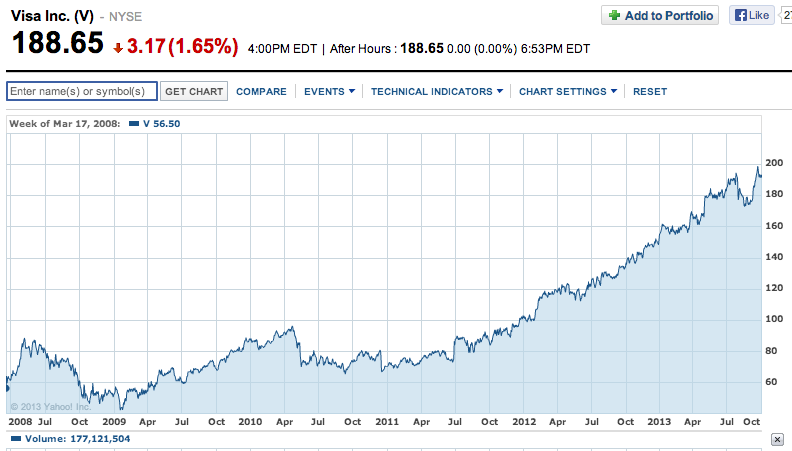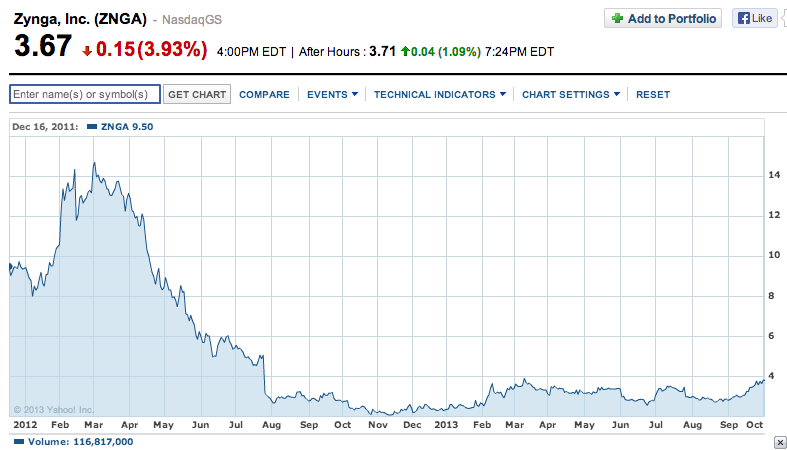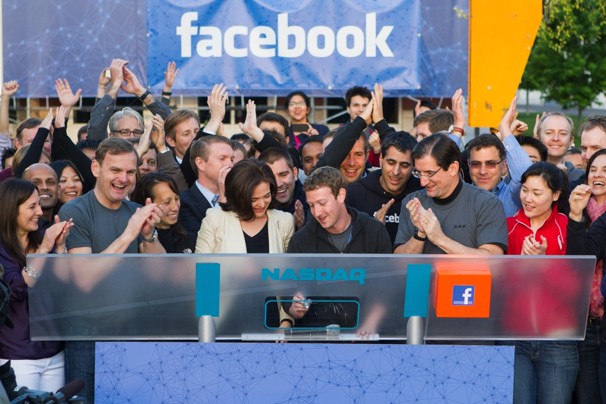Initial public offering. For the uninitiated – and you really need to stop screwing around and buy the book already – it’s when a company’s owners finally decide to realize their investment potential and let ordinary scrubs buy into the company. Sometimes an in IPO is the culmination of decades of patience on the part of owners who were in no hurry to get fame nor recognition, largely because they were too busy enjoying their show horses and vacation homes as owners of an established private company (e.g. Dave and Gail Liniger of RE/MAX, which went public Monday.) Other times, an IPO is an attempt to capitalize on momentary good fortune as soon as possible. We’ll let you decide which is generally the more prosperous route. In fact, we’ll let some visual aids aid you. Here’s what’s happened to Visa stock since the day it first traded:
And here’s Zynga stock, over the course of its shorter but no less eventful public existence:
As a general rule, being a ubiquitous global payments processor with billions of paying customers is a sounder financial strategy than creating animated time sinks emblematic of modern adulthood’s continued descent into permanent adolescence. (For Christ’s sake, they’re games, people.)
Which brings us to the latest headline in the money section: the upcoming initial public offering of Twitter.
Before we delve too deeply into this, a primer on how to read financial (or any other) news. Understand that consuming most of this stuff is not going to tangibly benefit you. For instance, from today’s USA Today Money section: “Battered Dow Falls Back Below 15,000”. Number 1, there’s nothing in the story that expounds upon the headline. Really, there isn’t. Read it if you don’t believe us. Number 2, even if there was, you can’t profit from it retroactively. A .9% drop in an index will barely affect your portfolio, especially since the index will likely bounce back tomorrow. Knowledge of the drop would only be valuable before the fact, which, as Andy Rooney and Sacha Baron Cohen demonstrated to great effect, is impossible:
Twitter’s going public, and the media can’t shut up about it. $1 billion in underwriting! Also, because Twitter is a social media service with something of a legitimate purpose, and hundreds of millions of users, the simpletons who prepare and serve news for your consumption are professionally bound to compare it to the famed IPO of Facebook even though the commonalities are only superficial. We had plenty to say about the Facebook IPO at the time, and our opinions haven’t changed. (The stock didn’t return to its initial price until 6 weeks ago.)
You know what excites us? Here, we’ll make that one of our patented multiple-choice (dual-choice, if you want to be specific) questions:
- A. Investing in something we use every day.
- B. Money.
Twitter is moderately useful for certain things, and can be entertaining depending on whom you follow. But it doesn’t do a blessed thing to extend anyone’s business, regardless of how badly this guy and millions more misguided fools want it to.
Here’s an actual usable paragraph we found from a New York Times story. Because it’s important, they buried it in the text:
[Twitter] has also been losing money, reporting a net loss of $79 million last year and $69 million for the first six months of 2013. Even after adjusting for stock option compensation and other items like depreciation, Twitter has still reported steady losses.
Where do we sign up, then? And how long do we have to wait to get our hands on that sweet IPO?
Unless you live in Denver, and even then it’s doubtful, you’ve likely never heard of Antero Resources. It’s a company that extracts oil and natural gas, all of it right here in North America; the Appalachian Basin, to be precise. Antero’s been around slightly longer than Twitter, the former being founded in 2002. The company predicts an opening price of between $38 and $42, making its IPO somewhere around a $1.2 billion proposition. Antero lined up every big underwriter – Barclays, Credit Suisse, Citi, JPMorgan, Wells Fargo et alia – and is expected to first trade publicly a week from today.
There are dozens of oil and gas companies. The finished products of one are largely indistinguishable from those of the rest. In fact, the finished products of most of them aren’t even anywhere near the final link of the production chain. (Most explorers stop their involvement short of the refinery, let alone the retail stores.) Created by 2 middle-aged industry veterans, Antero originated in a boardroom of a law office, not in the basement of a Silicon Valley townhome populated by 20-somethings. Celebrities don’t patronize Antero, at least not consciously. Antero was nowhere to be found during the riots in Tahrir Square.
As a private company (for another week), Antero’s financials didn’t have to be disclosed until the company filed with Securities and Exchange Commission for the IPO. Antero could have been losing money faster than Twitter is, for all we’d know. Except Antero isn’t. In fact, it’s stupendously profitable. Assuming that 60% profit margins are your thing, and in a capital-intensive industry no less. Antero has 200 employees, and most of those are seasoned petroleum engineers, rather than quasi-paid intern programmers. The company qualified for $2 billion in loans last month, meaning that either its credit is fantastic or the lenders are confident of the company’s future profitability.
No one, at least no other personal finance blogger, is going to write about Antero’s upcoming IPO when it’s easier to follow the crowd and blather on about Twitter. Anyone want to meet us back here in 6 months and see which company’s stock is doing better? Now if you’ll excuse us, we have a line to wait in.





